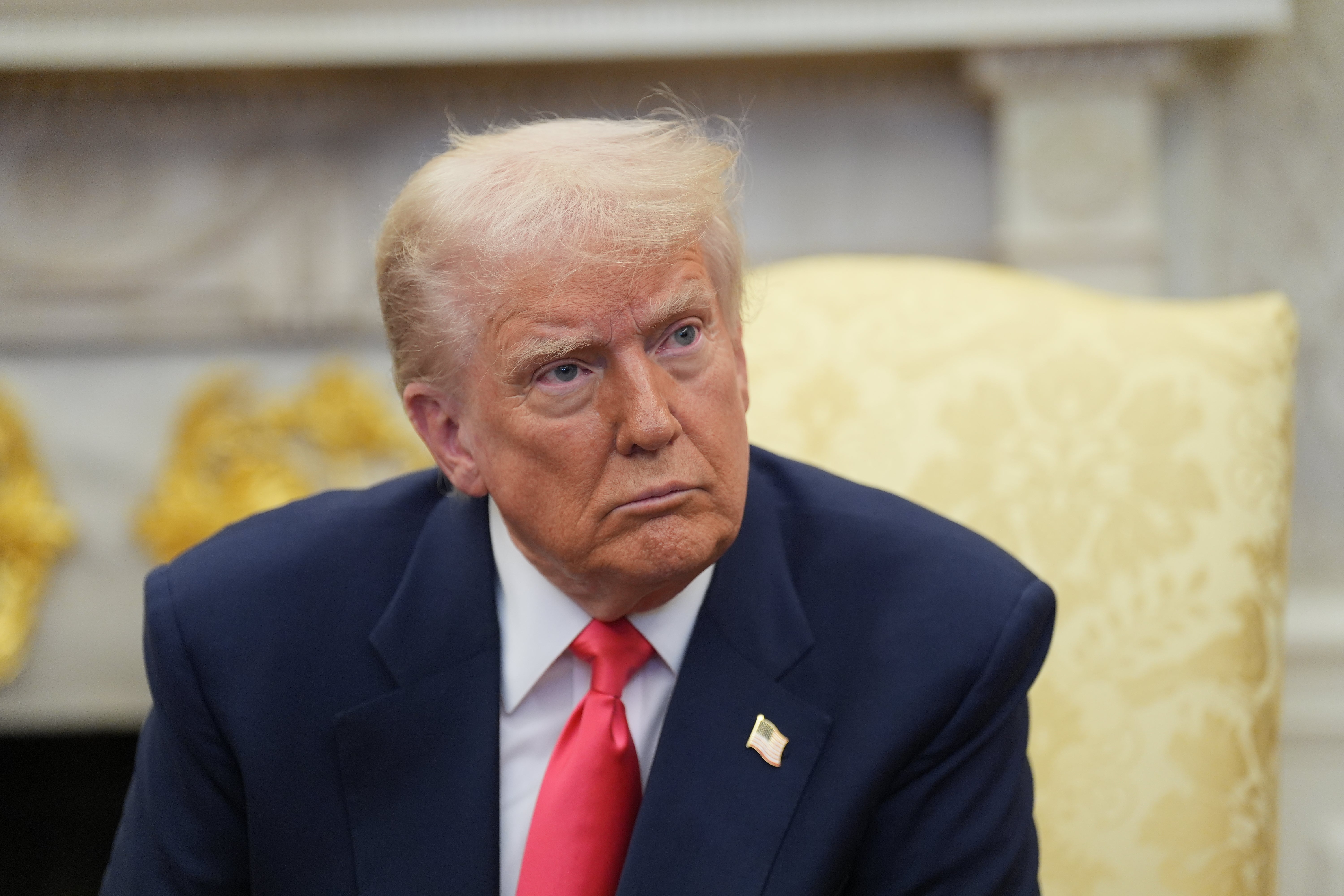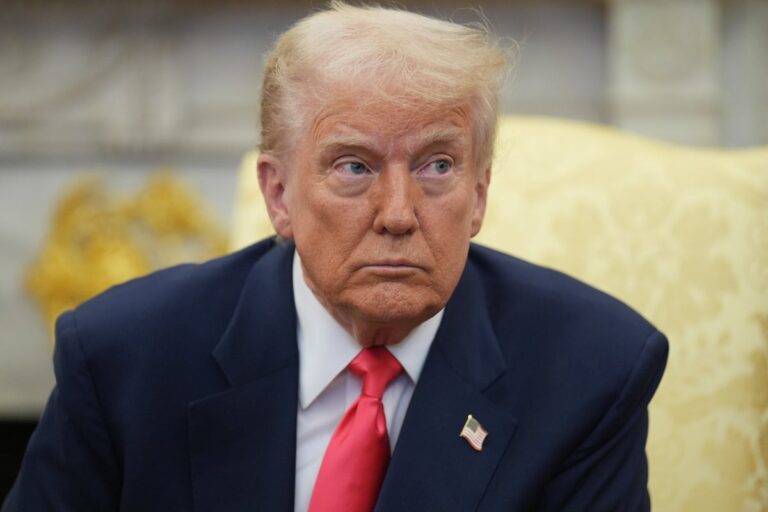Your support helps us to tell the story
From reproductive rights to climate change to Big Tech, The Independent is on the ground when the story is developing. Whether it’s investigating the financials of Elon Musk’s pro-Trump PAC or producing our latest documentary, ‘The A Word’, which shines a light on the American women fighting for reproductive rights, we know how important it is to parse out the facts from the messaging.
At such a critical moment in US history, we need reporters on the ground. Your donation allows us to keep sending journalists to speak to both sides of the story.
The Independent is trusted by Americans across the entire political spectrum. And unlike many other quality news outlets, we choose not to lock Americans out of our reporting and analysis with paywalls. We believe quality journalism should be available to everyone, paid for by those who can afford it.
Your support makes all the difference.
Read more
President Donald Trump changed course again on Wednesday and announced a 90-day pause of his so-called “reciprocal” tariffs while hiking other duties on China to 125 percent.
The president’s decision followed several days of sharp losses on the stock market. In a Truth Social post, Trump claimed that his reversal was a result of what White House officials have claimed are dozens of foreign nations reaching out with the intention of re-negotiating trade policy with the United States, rather than implementing tariffs of their own.
He said on Wednesday afternoon that his decision was made in response to days of market panic and rippling effects across various economic sectors, which Trump and other White House officials spend days unsuccessfully trying to quell.
“I thought that people were jumping a little bit out of line. They were getting yippy, you know, they were getting a little bit yippy, a little bit afraid,” Trump told reporters at a White House event with NASCAR drivers Wednesday afternoon. “I’ve reversed it. It’s for a short period of time.”
Trump’s abrupt reversal of what he had characterized as a signature policy initiative meant to reverse decades of globalization and international integration of supply chains put a temporary stop to a week of uncertainty in international capital markets and fears among American investors that their savings were being wiped out by the president’s decision to unilaterally impose import taxes on some of the country’s most reliable allies and trading partners.
“We can expect continued market volatility, regardless of whether this 90-day pause extends or not,” Dinesh Hasija, a professor at Augusta University’s James M. Hull College of Business, told The Independent on Wednesday.
“Based on 2018–2020 U.S.–China trade war, markets react more to uncertainty than to the tariffs themselves,” said Hasija. “We saw major swings in investor sentiment based on policy signals and negotiation headlines. While an extended pause from tariffs might offer short-term relief, without a clear path toward a durable agreement, the underlying uncertainty will continue to drive fluctuations. Markets are looking for predictability—and in the absence of that, volatility remains the most likely outcome.”
The president’s latest move also came just days after White House officials said Trump would not back down or reverse course despite criticism from members of his own party who correctly describe the tariffs as a massive tax increase.
“[B]ased on the fact that more than 75 Countries have called Representatives of the United States […] and that these Countries have not, at my strong suggestion, retaliated in any way, shape, or form against the United States, I have authorized a 90 day PAUSE, and a substantially lowered Reciprocal Tariff during this period, of 10%, also effective immediately,” the president wrote on Wednesday.
He added of China: “At some point, hopefully in the near future, China will realize that the days of ripping off the U.S.A., and other Countries, is no longer sustainable or acceptable.”
While taking questions later Wednesday afternoon, the president would go on to claim that China “wants” to make a deal, but wasn’t sure “how to go about it”. He then labeled Chinese people a “proud people”.
Stock markets soared to near-record gains after Trump’s announcement.
At the White House on Wednesday afternoon, Trump’s press secretary Karoline Leavitt and Treasury Secretary Scott Bessent sought to downplay talk of Trump reversing course or backing down by characterizing his abrupt about-face as part of a savvy negotiating strategy rather than a reaction to criticism or panic over the tumbling stock markets.
“We have had more than 75 countries from around the world reach out to President Trump and his team here at the White House to negotiate better trade deals for the American worker. We have been overwhelmed with the amount of requests for countries around the world,” said Leavitt, added that the increase tax on Chinese imports — forcing Americans to pay more than double the actual cost of any goods imported from China, were a punitive measure “because China imprudently decided to retaliate against the United States.”
Leavitt also confirmed that the “reciprocal” tax rate Trump had unveiled for imports from other countries — initially based on an unscientific formula derived from trade deficit data — would drop to 10 percent for the duration of the 90-day pause. That pause would only affect across-the-board duties on imports, leaving in place the specific tariffs the US has levied on individual sectors of the economy.
Bessent told reporters that the 10 percent tariffs would also apply to imports from Mexico and Canada, marking another reversal from a series of taxes Trump had imposed on goods from the two close American allies.
He said the exorbitant taxes on Chinese goods were justified because China is “the most imbalanced economy the history of the modern world” and “the biggest source of the US trade problems.”
“I’m not calling it a trade war, but I’m saying that China has escalated, and President Trump responded very courageously to that,” he added.
Bessent also characterized the president’s decision to back down as the result of Trump having “created massively negotiating leverage for himself.” and said he looks forward to the talks between American officials and the countries that have expressed interest in negotiating agreements with the administration.
“We’ve just been overwhelmed, overwhelmed by the response from mostly our allies, the ones who come and negotiate in good faith. So we are expecting them to come with their best deal,” he said. “Each one of each one of these solutions is going to be bespoke. It is going to take some time, and President Trump wants to be personally involved, so that’s why we’re hitting the 90 day plan.”
Less than 24 hours earlier, Trump had hailed the policies he was imposing as a harbinger of an American manufacturing renaissance that would keep his Republican Party in power after next year’s midterm elections during a black tie gala with deep-pocketed GOP donors and House members who will be up for re-election in 2026.
He told attendees at the National Republican Congressional Committee’s annual fundraising gala that the stage is now “set for a monumental victory for the Republicans in the midterms” on account of his policies, which most mainstream economists and business experts say will supercharge inflation and threaten America’s status as the world’s leading economy with a grievous self-inflicted wound.
“I really think we’re helped a lot by the tariffs situation. It’s great,” he said.
He discounted the economists and critics who’ve warned that his tariff policies will lead to a recession and insisted to attendees that he “know[s] what the hell I’m doing.

“I’m the only one that would have done the tariffs, because everybody was afraid. They were afraid of being criticized, because the globalists will go after you,” he added.
Trump also claimed that other countries are paying the tariffs, including the whopping 104 percent levy on Chinese goods, and said the tariffs are a way of turning the tables on partners who have mistreated the U.S.
“Countries are paying tariffs right now, China’s paying a 104 percent tariff … many countries have, they’ve ripped us off left and right, but now it’s our turn to do the ripping. That’s okay,” he said.
While markets surged in the wake of the announcement, the president’s critics questioned whether the news was just the latest example of the kind of instability they argue will inhibit the same economic investments in manufacturing and other sectors which Trump says he wants to encourage.
Tommy Vietor, former Obama White House official and co-host of Pod Save America, wrote on Twitter: “This idiotic tariff policy tanked the market nearly 20% and now they want to act like Trump blinking and recouping a only one third of that loss is some genius move.”
“This is reckless governing. There is no strategy and it’s obvious this is amateur hour,” Rep. Steven Horsford, a Democrat, added.
Peter Richiutti, a senior finance professor at the Tulane University School of Business, said Trump’s move would cause markets to “show both more stability and likely some price appreciation with just a 90 day pause.”
“This will give the President ways to declare victory on very little actual progress from the tariff policies,” said Richiutti, who expressed some incredulity at the president’s course of action, citing the universal opposition to his tariff policies by most economists.
“You’ve got to wonder who his advisors were. It seems that every economist announced their feelings that the tariffs were a bad idea.The wild card here is that the tariff story/ rules seem to change every day,” he said.


